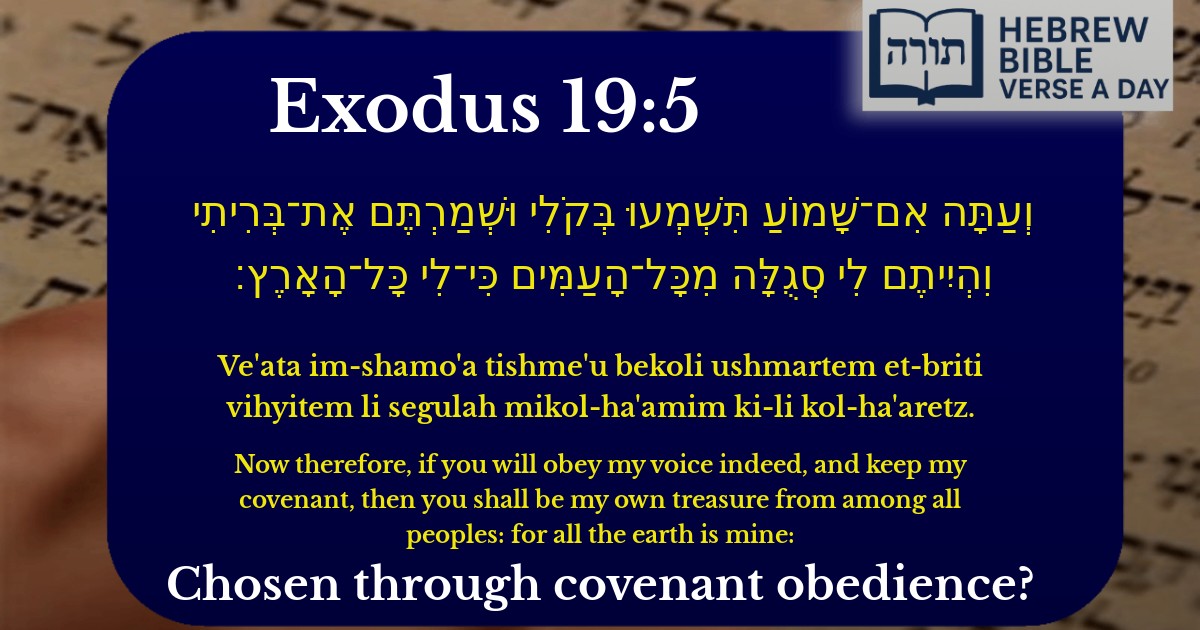Join Our Newsletter To Be Informed When New Videos Are Posted
Join the thousands of fellow Studends who rely on our videos to learn how to read the bible in Hebrew for free!
Hebrew Text
וְעַתָּה אִם־שָׁמוֹעַ תִּשְׁמְעוּ בְּקֹלִי וּשְׁמַרְתֶּם אֶת־בְּרִיתִי וִהְיִיתֶם לִי סְגֻלָּה מִכָּל־הָעַמִּים כִּי־לִי כָּל־הָאָרֶץ׃
English Translation
Now therefore, if you will obey my voice indeed, and keep my covenant, then you shall be my own treasure from among all peoples: for all the earth is mine:
Transliteration
Ve'ata im-shamo'a tishme'u bekoli ushmartem et-briti vihyitem li segulah mikol-ha'amim ki-li kol-ha'aretz.
Hebrew Leining Text
וְעַתָּ֗ה אִם־שָׁמ֤וֹעַ תִּשְׁמְעוּ֙ בְּקֹלִ֔י וּשְׁמַרְתֶּ֖ם אֶת־בְּרִיתִ֑י וִהְיִ֨יתֶם לִ֤י סְגֻלָּה֙ מִכׇּל־הָ֣עַמִּ֔ים כִּי־לִ֖י כׇּל־הָאָֽרֶץ׃
וְעַתָּ֗ה אִם־שָׁמ֤וֹעַ תִּשְׁמְעוּ֙ בְּקֹלִ֔י וּשְׁמַרְתֶּ֖ם אֶת־בְּרִיתִ֑י וִהְיִ֨יתֶם לִ֤י סְגֻלָּה֙ מִכׇּל־הָ֣עַמִּ֔ים כִּי־לִ֖י כׇּל־הָאָֽרֶץ׃
🎵 Listen to leining
Parasha Commentary
📚 Talmud Citations
This verse is quoted in the Talmud.
📖 Avodah Zarah 2b
The verse is referenced in the context of discussing the unique relationship between God and the Jewish people, emphasizing their chosen status among all nations.
📖 Shabbat 88a
The verse is cited in a discussion about the acceptance of the Torah by the Israelites, highlighting their willingness to obey God's voice and keep His covenant.


Context in the Torah
This verse (Shemot 19:5) appears in the narrative leading up to Matan Torah (the Giving of the Torah) at Har Sinai. Hashem is preparing Bnei Yisrael to enter into a unique covenant with Him, establishing them as His chosen people.
Key Terms and Their Meanings
The Nature of the Covenant
The Ohr HaChaim highlights that this verse establishes a conditional covenant - Israel's special status depends on their fulfillment of Torah. The Kli Yakar notes the verse's structure shows obedience ("shamoa") must precede careful observance ("shamartem").
Israel's Unique Role
Rambam (Hilchot Yesodei HaTorah 1:1) derives from "ki li kol haaretz" that while Hashem rules all nations, Israel has a unique mission to sanctify His Name. The Midrash Tanchuma (Re'eh 1) compares Israel to a cherished vineyard among many fields.
Practical Implications